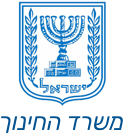Rabbi Meir Shapira of Lublin z”l and the Gerrer Rebbe, the Imrei Emet z”l
Commemorating 90 years since Rabbi Shapira z”l’s passing on Cheshvan 7, 5784 (falling on Oct. 22, 2023)
By: Rabbi David Avraham Mandelbaum
The Educated and Multi-talented man
The Gerrer Rebbe z”l, the Imrei Emet, wrote in a letter (12 Tevet 5686/Dec. 29, 1925) about Rabbi Meir Shapira z”l:
“When the Agudah was renewed etc., which is headed by the educated and multi-talented man, the genius rabbi from Piotrkow, may he be for many years.”
It is not for nothing that the Rebbe chose to describe Rabbi Shapira with the title “educated man of many talents.” It is a title that the Rebbe z”l wrote in his generation about individuals of virtue.
And when the Rebbe was asked how he described one of the greatest rabbis of his generation with the title “the educated man of many talents”, the sages said (Gemara Sota 47:71): “From the time when Yossi ben Yo’ezer of Tzereida and Yossi ben Yehuda of Jerusalem died, the clusters (educated and multi-talented men) ceased”. The Rebbe showed him the words of the Tosfot in Bava Metzia “in glass etc.” As it says in the Gemera (Sota 48:71): “When the Temple was destroyed, there was no more white glass, not completely absent, but rare.”
Indeed, the “educated and multi-talented man” is not a common thing, but it is a thing that exists. For it is the crown of only a few individuals in every generation can wear.
And indeed, in an amazingly breif way, these words sum up our Rabbi Shapira, who had everything in him, a tremendous genius in the Torah and Chassidism, a wonderful speaker, witty, and full of wisdom, an educator with supreme grace, a leader from the womb and birth, a man of sharp prayer, a visionary, reaching far for the individuals of the generation. Chassidic and humble, completely surrendered to his rabbis. “The educated and multi-talented man,” literally and figuratively.
* * *
The Daf Yomi (Study program whereby a page of Gemara is studied each day)
Already at the first Great Congress of Agudath Israel that gathered in Vienna in Elul 5683 (1923), the Rebbe had his eyes on the good of Rabbi Shapira, and strengthened his hands in the regulation of the study of the daf yomi that Rabbi Shapira presented at the Great Congress.
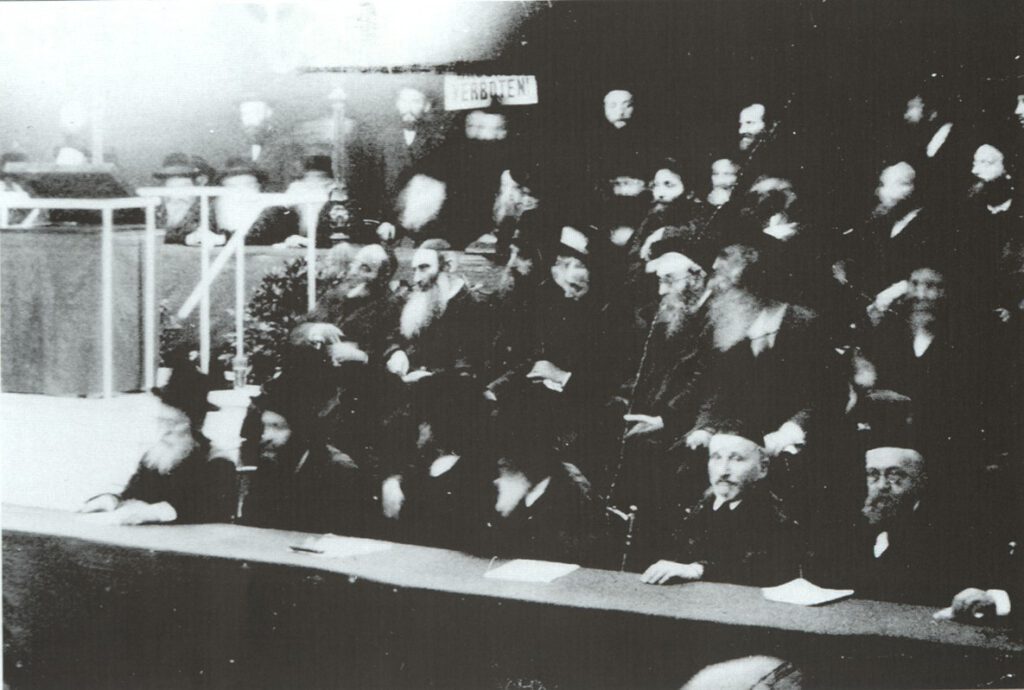
The right side of the leadership’s table at the first Great Congress of Agudath Israel. From right to left, one can see Rabbi Azriel Munk, Rabbi Michael Kahan from Fulda, Germany, last on the left is Rabbi Aaron Levin of Reisha and in front if him is Rabbi Meir Shapira of Lublin.
And it is known that on the night of Rosh Hashana, when thousands of chassidim came from all over Poland to the study hall in Gur (Gora Kalwaria), on the first day of Rosh Hashana, the Jews began studying the first cycle of the daf yomi.
The crowd in the study hall was enormous, clusters of chassidic flowers hanging from every nook to see the face of the Rebbe who had just finished his prayer and was on his way home.
Suddenly, the Rebbe appeared, turned to the crowd, and said: “I am going to learn the daf yomi.”
The words passed like a current of electricity among the thousands present, and according to the testimony of the late Rabbi Yudel Sonnenshein, who was then in the Ger study hall, they did not last minutes, and all the thousands in the study hall sat around the Tracatate Brachot. One could see groups of ten people sitting around and reading the words of page two of Brachot; everyone wanted to join the Rebbe in learning the daf yomi… and what a precious thing this was. The Rebbe, who did not usually share his “behaviours” with the audience, read as usual with a brief allusion to all the chassidim and all the people of Israel to join him in studying the daf yomi.
Even the chassid Rabbi Chanoch Henich HaLevi Manela z”l, who was at the study hall at the time, would for the rest of his life, describe with great excitement how in one second the study hall would become excited and everyone would rush to search for Tractate Brachot of Gemara in order to join the Rebbe in learning the first page.
Even his holy words at his pure table on that Rosh Hashanah night, revolved around the issues of the first page of Tractate Brachot, as printed in his holy book “Imrei Emet” regarding Rosh Hashana 5684 (1923).
As is widely known, the same rumour spread its wings all over Poland and the Diaspora, and wherever the word of the King and his religion reached, from what happened on the night of Rosh Hashanah in Gur, that even the holy Rebbe himself opened his Talmud to the page of the daf yomi, everyone joined in setting lessons in the order of the schedule of the daf yomi, and this fact made a huge contribution at the start of the program, to lay down the foundation of the learning of the daf yomi amongst the Jewish People, a fact that today has become an inseparable part of the agenda of many Jews wherever they are.
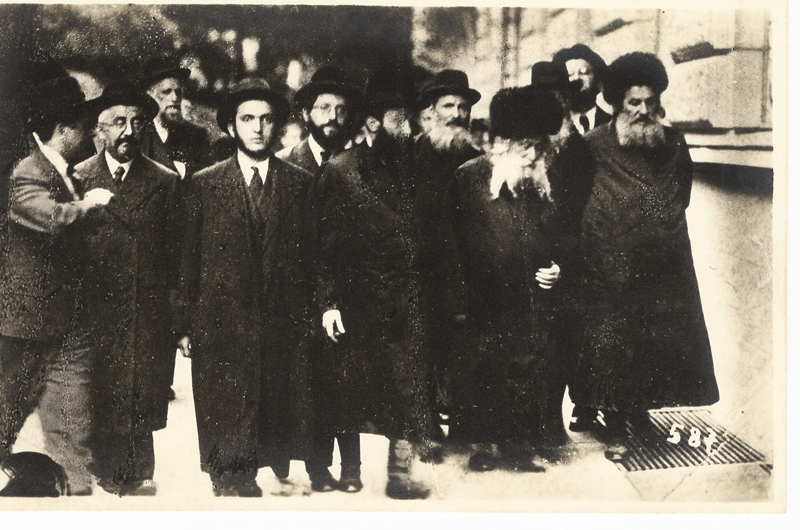
The Imrei Emet with his chassidim
* * *
Our Rabbi, Rabbi Meir Shapira, who himself was surprised by the power of the idea and how it was perceived in all Jewish communities, wrote an emotional letter a short time later to his friends, and these are his words:
“The daf yomi program that was decided upon at the Congress according to my proposal is a large and permanent regulation, and we already have a list of more than two hundred thousand members in Poland who study the lesson every day. The Gerrer Rebbe also learns the lesson, and I heard that he told the people close to him that he meritted greatly to have such a program in front of him.”
“And I know in my heart, that my work in the field of education in general, and the passion that I have for Torah students in particular, has brought me here, with the help of G-d.”
And the chassidic genius, Rabbi Gedalya Hertz z”l (head of the Chidushei Harim Yeshiva in Tel Aviv) who dined at the table of the Gerrer Rebbe, the Imrei Emet, on the Passover Seder night in 5696 (1936) in Jerusalem (from the book Or Zarua La’Tzadik by A. Rello, and the book Binso’a Aron), testified that at the end of the Seder, when the Rebbe rose from his seat, he said to those present, “I am going to study the daf yomi.” (as heard from Rabbi Yudel Frankel).
Later, when Rabbi Shapira’s yeshiva, Chachmei Lublin, fell into a difficult financial situation, he came up with a wonderful idea in his genius mind, and these are his words in the letter:
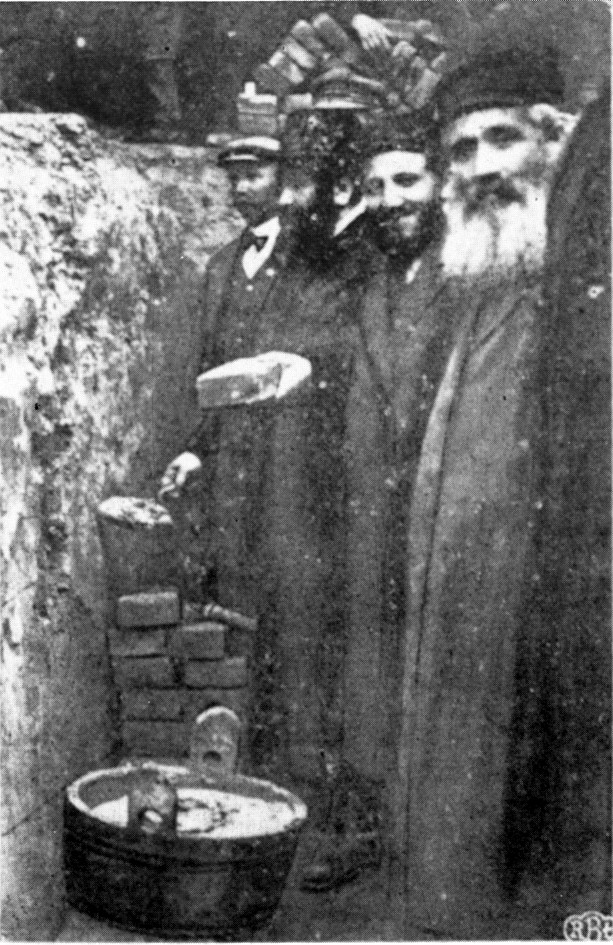
Rabi Meir Shapira at the cornerstone laying ceremony for the Chachmei Lublin yeshiva
“It was agreed at the assembly to “raise the Torah’s foundations” on Tuesday, the week of the Lech Lecha Torah portion, in the presence of the Gerrer Rebbe – that every seriously Orthodox Jew would give a groszen (Polish money) for each page studied, in such a way that on the day of the conclusion of each tractate, a sum of groszen would be collected from each according to the number of pages in the tractate, for a siyum (party for completion of study).”
Here, too, the Gerrer Rebbe z”l was good at requesting and getting the requests fulfillled, and in a letter he wrote to Rabbi Shapira towards the end of the first Shas (6 orders of the Mishna) cycle, together with the amount accumulated for each page the Shas, the Gerrer Rebbe wrote:
“My beloved friend, the genius rabbi, a wise and holy man, known in the gates (of Heaven) is the name and glory of Rabbi Shapira.”
“I hereby fulfill the requirement to support the magnificent yeshiva whose honor is high, and I hereby send the sum of 27 zlotys (1 groszen for each page of the Shas cycle we have already studied) and without a doubt those who are more capable than me will see and do so.”
“These are the words of one of his admirers who asks for his wellness as well as the wellness of the Torah and all his students, and blesses you with eternal success.”
Indeed, the letter of the Gerrer Rebbe left a huge impression, and the Jews of Poland responded to the holy call and did so, thousands of Jews happily carried out the instruction of their rabbis, and upon their return each day from the study hall from their daf yomi lesson, they happily deposited the daily sum into the collection box of the Chachmei Lublin yeshiva, thereby linking themselves in spirit and deed to the Eternal Source and Source of the Torah.
* * *
Agudath Israel
Rabbi Shapira and the Gerrer Rebbe became close, as the Rebbe greatly appreciated Rabbi Shapira’s greatness in the Torah and his ability to act for the benefit of the Jewish People. For many years, Rabbi Shapira served as the Rebbe’s emissary in all his social activities, which provided him with complete training in all his actions and steps in the leadership of the community.
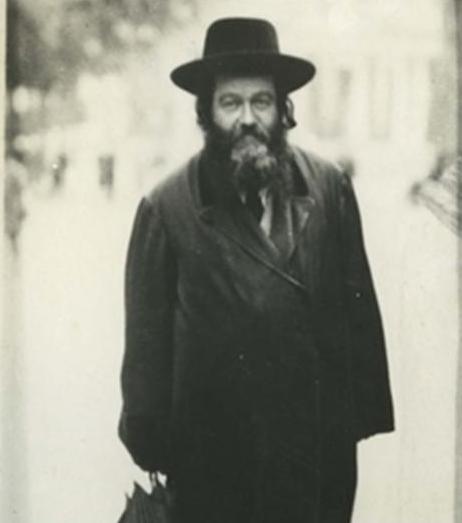
Rabbi Meir Shapira, the head of the Chachmei Lublin Yeshiva, on his way to a meeting at the Polish Sejm (parliament) as an emissary of Agudath Israel
It was the Rebbe z”l who initiated and was behind the proposal to appoint Rabbi Shapira to the position of “President of Agudath Israel”, and even begged him to accept this appointment, as expressed in his famous letter to the teacher Rabbi Yaakov Rosenheim:
“And it was with great difficulty that I convinced the genius rabbi from Piotrkow, a man capable of this, to accept the reins of the government in his hands.”
It is said that some time after his election to this position, Rabbi Shapira came to the Gerrer Rebbe, but to his surprise the Rebbe did not let him in… The rabbi asked the Rebbe’s assistant to ask the Rebbe on his behalf to accept him, because he has to consult with him on an important matter regarding Agudath Israel.
The Rebbe was pleased and accepted our Rebbe. Immediately upon entering, our Rebbe asked the Rebbe why they didn’t let him enter previously.
The Rebbe answered him:
“One of my intentions in why what I wanted your honour to serve as president of Agudath Israel in Poland was so that it would not be said that Agudath Israel only represents Ger… After all, a distinguished Czortkow chassid was chosen for its highest position… Now, if his excellency continues to come to me, Ger, they will once again say that the Agudath Israel is made of only one skin, and this is not the trend of Agudath Israel, which should unite all circles of strictly orthodox Judaism.”
Rabbi Shapira agreed and accepted with a smile and understanding the leadership actions of the Gerrer Rebbe…
Rabbi Shapira was crowned as the president of Agudath Israel in Poland in the place of the Gerrer Rebbe, the Imrei Emet z”l. But when he began to dedicate himself to the building of the Chachmei Lublin yeshiva, he asked to be released from this position, and said to the Rebbe z”l:”If they let me devote myself completely to the establishment of the yeshiva, I can engage in teaching hundreds of students the Torah and to be G-d-fearing, and within a few years, they will also be imbued with the sublime ideas of Agudath Israel and will serve as dedicated generals.” Indeed, the Rebbe appointed his son-in-law, Rabbi Yitzchak Meir Levin, in Rabbi Shapira’s place, (Meir Ledorot, Part 1, pg. 188).
* * *
The Chachmei Lublin Yeshiva
Even in Rabbi Shapira’s private enterprises, the Gerrer Rebbe z”l was one of his enthusiastic supporters, his blessing and encouragement accompanied the idea of the Chachmei Lublin yeshiva from the beginning of its creation; he was also officially among the members of the yeshiva’s board, in which he saw the creation of a sanctuary that increased the honour of Heaven and the honour of Torah in the world.
The Rebbe’s rare public appearances in the cornerstone laying ceremony and the inauguration of the yeshiva gave this work a special stamp as the crown jewel of the kingdom of Torah in Poland and in the whole world.
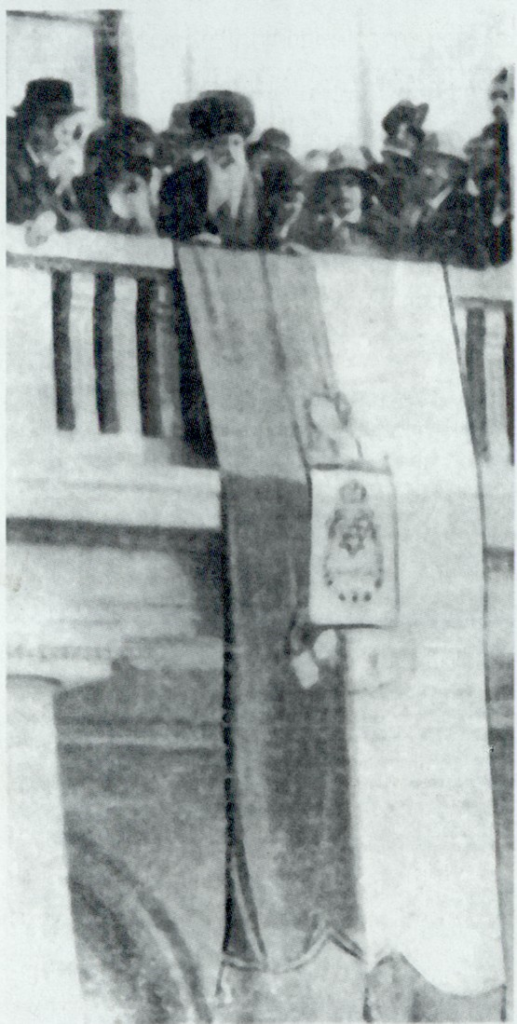
The Imrei Emet on the balcony of the Chachmei Lublin yeshiva upon its inauguration
But let’s go back a bit to the beginning days. The chassidic Rabbi Mordechai Tzvi Shtelberg, who was a prominent student of Rabbi Shapira z”l, when he served as the rabbi of Piotrkow, told: “After our Rabbi z”l, received the large plot in the city of Lublin from the generous Rabbi Shmuel Eichenbaum – may G-d avenge his blood, and the decision had already been made by our rabbi to establish the great yeshiva there, the Chachmei Lublin yeshiva, our rabbi went to Ger, to tell the Rebbe, the Imrei Emet z”l, of the chain of events and ask for his holy blessing.”
“I accompanied our rabbi on this journey, our rabbi entered the Rebbe’s place, and left a short time later, completely pale.”
“He barely agreed to tell me anything, only that the Rebbe heard him and responded:
Why not in Israel?”
“Our rabbi was completely amazed by the question, and he had no answer for the Rebbe. He shook his hand and left. And now he walked thoughtfully and thought…”
Suddenly our rabbi shrugged and said to me:
“Let’s go to Lublin. Maybe we will find some solution to the Rebbe’s question…”
“We got on the train. We went to the city of Lublin.”
“We arrived at the train station in the city of Lublin. And there in front of us were several Jews from the residents of the city, who knew our rabbi, and in their words they said that a very old chassid, the great-grandson of the Chozeh of Lublin rabbi, was laying on his sick bed, and his hours were numbered.”
“Our rabbi’s eyes lit up and he turned to me and said to me: ‘Perhaps we will have an answer here to the things we heard from the Gerrer Rebbe.'”
“We went to the chassid’s house, Rabbi Shapira approached him and asked if he could tell him something special that he had heard from his family in the name of the Chozeh; the elderly man answered and said:
‘In the city of Lublin, you feel the sanctity of the Land of Israel, and also the sanctity of Jerusalem and the sanctity of the Temple…'”
“Rabbi Shapira thanked him from the bottom of his heart for his words and his blessing. When they left, Rabbi Shapira turned to me and said:
‘You see, from heaven we directed our feet, here the holiness of Lublin is like the holiness of the Land of Israel, and we already have an answer for the Gerrer Rebbe…'”
Now Rabbi Shapira was able to rest, based on the words of his above-mentioned student z”l.
[In connection with the above, it should be noted what is mentioned in the book “Niflaot HaRebbi:” Rabbi Uri of Stralisk said, when they come to Lublin, he will paint it as if it is the Land of Israel, and and the home of the rabbi is the hall, and the Ezra is the Temple, and its courtyard is The Holy of Holies, and the Shechina (G-d’s presence) is speaking from his throat – then he will understand what Rabbi Shapira was saying].
And here came the great day, Lag Ba’Omer 5684, and in the city of Lublin there was a huge and unusual celebration, the laying of the cornerstone for the Chachmei Lublin yeshiva.
On the designated field, crowds gathered, crowds were waiting and ready for the start; on the improvised stage one could see the great righteous men of the generation who came to take part in the great event of the renewal of the kingdom of the Torah – the Gerrer Rebbe, the Czortkow Rebbe and his sons, the Sokolow Rebbe, the Slonimer Rebbe, and the Rebbes of Modzitz, Kuznitz, Novominsk, and a special representative of the Belzer Rebbe in the form of his son, the Rebbe of Ostila, and dozens of other rabbis from all over Poland and Galicia. Everything was ready, but one detail was yet to be resolved.
Later, Rabbi Shapira told his close disciples that in those moments full of elation, when the large crowd eagerly awaited his appearance, as the star of the show, Rabbi Shapira was worried and confused as he did not know who to honour first at the laying of the cornerstone, whether it should be the Gerrer Rebbe or the Czortkower Rebbe who was his own Rebbe. Because he didn’t know how to solve the problem, he left the matter as it was, with a strong belief, that the rabbi himself, would release his doubts.
Close to the cornerstone laying, the Czortkower Rebbe turned to the Gerrer Rebbe and said: “It would be good for the Gerrer Rebbe to lay the cornerstone…” The Gerrer Rebbe shrugged and replied, “What, me?” And while speaking, he bent down and lifted the stone and handed it over to the Czortkower Rebbe so that he would be the first to lay the stone…
The Czortkower Rebbe took the stone, took out two silver coins from his pocket and asked the Gerrer Rebbe to look at the coins. The Gerrer Rebbe looked at them, and immediately the Czortkower Rebbe wrapped the stone together with the coins in a silk handkerchief and placed them together in the pit that was prepared for this, and Rabbi Shapira’s face lit up…
Rabbi Shapira and the large crowed that stood near them looked at what was happening with great excitement.
“What were the coins?” Rabbi Shapira asked after a while.
“I do not know until this day,” he said with complete faith.
The Rebbe opened up and said:
The Sages said in Bilkot: “But despite all this, while they are in the land of their enemies, I will not despise them nor will I reject them, etc. – What will we leave for Israel that has not had enough? We will leave them a Torah book, that if Israel had no existence in the Torah, they would not be any different from the nations of the world.” These things are a promise intended for our time, when Israel is in the land of their enemies, in exile, and we will not be left with anything from them, and despite everything, when it comes to saving the Torah, no sacrifice is considered too precious, this is the secret of our existence, and the evidence – this day, until this “pile”, on the day of Lag Ba’Omer, “this monument will be a witness” – the cornerstone…
And the words made a huge impression.
* * *
During the construction of the yeshiva, the Gerrer Rebbe z”l showed interest and active involvement in the mobilization of resources for the building and its maintenance, and for this purpose he encouraged wealthy individuals from among the Ger chassidim to contribute generously to the yeshiva,
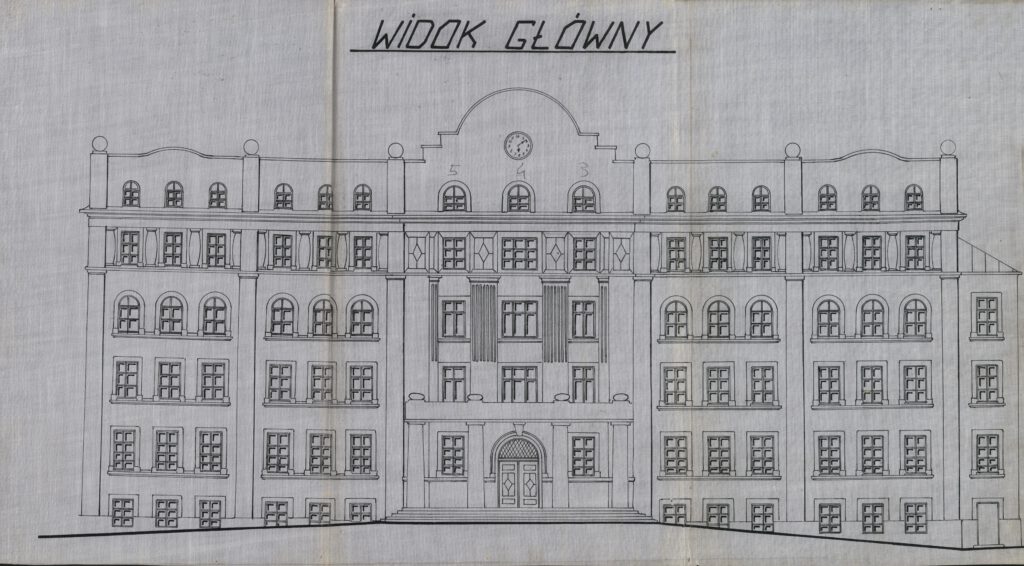
A sketch of the yeshiva building before it was built
The former student, Rabbi Pinchas Hirschprung z”l told:
“The completion of the upper floor was made possible by the donation of the well-known philanthropist Rabbi Hershel Hirschprung z”l of Krakow.”
The aforementioned Rabbi Pinchas Hirschprung testified that in fact the famous gentleman Rabbi Chaim Finkelstein z”l of Antwerp, promised Rabbi Shapira at the beginning of the construction that when he reached the sixth floor, he would give him a considerable sum of money to complete the building.
But apparently, in the depths of his heart, he did not believe that the building would be erected, and when they reached this floor he evaded saying that from the beginning his promise was for the fence “so that it would rise to the sky”, and it was not in his mind to keep the promise.
But Rabbi Shapira didn’t give up and went to the Gerrer Rebbe, as the genteman was one of his followers. The Rebbe got involved, and finally made a fair compromise to the satisfaction of all parties.
Even when a huge uproar arose in Poland and Galicia over the “Chachmei Lublin yeshiva charity boxes”, and all the great and righteous men of the generation expressed their opinion here and there for and against the boxes, Rabbi Shapira wrote in a public letter that he issued on this matter:
“And I hereby faithfully declare that even the holy Jewish genius, the Gerrer Rebbe who knows all secrets, will not harm me. He said with his holy mouth that he knows the details of the regulations and there is no prohibition of charity boxes and that the holy genius is a model of his generation. He ordered that, according to the halacha (Jewish law), it is not in their power to forbid such a thing and testified at that time about his father, the holy genius, the Sfat Emet Rebbe, who kept charity boxes of various mitzvahs in his house.”
And indeed this opinion was also expressed by the Imrei Emet z”l in a letter he sent to Rabbi Ephraim Shraga Weingott z”l of Safed (today it is housed in the home of his grandson, Rabbi Reuven, in Jerusalem), and there were his holy words:
“We are following the opinion of the Chidushei Harim z”l, he doubled and tripled without mentioning new prohibitions to make Jews stumble; it seems that the rabbis of Lithuania desired or prohibited other boxes. Of course, in the Land of Israel, we will accept the Chidushei Harim’s system, and there is no house that does not also have other boxes besides the boxes of Rabbi Meir Baal HaNes, Talmud Torah, and helping brides etc. etc. There is even a box for helping brides, and it came to mind that G-d forbid it would be boycotted, it will make the matter of a boycott easier in the eyes of the public because, they will learn from this for all kinds of prohibitions to make them easier.”
The inauguration of the Chachmei Lublin yeshiva was a high point in Rabbi Shapira’s life. The preparations for the designated day, 29 Sivan 5690 (June 25, 1930), encompassed the entire world.
In preparation for the inauguration, invitations were sent to all the great men of the generation to come and participate in the Torah oriented celebration. Advertisements were published in the newspapers for the general public, including the detailed program of the days of the celebrations and the various events that would take place during them.
On the eve of the Shabbat of the Torah portion of Shlach, which was close to the day of the celebration, Rabbi Shapira came to the town of Gur (Gora Kalwaria) to sit in the shade of the Gerrer Rebbe z”l and to invite him to the inauguration ceremony.
On Shabbat night, he dined at the Rebbe’s table and was honored with an invitation to bless the food. On Saturday night, he left for Piotrkow, the city where he served as rabbi.
The attention of the entire huge crowd that came was directed to the two tzaddiks (righteous men) of the generation, the Gerrer and Czortkower Rebbes z”l.
A student of the yeshiva, Rabbi Shmuel Tanchum Rubinstein z”l, described how the yeshiva students made preparations to go to the train station and greet the great men of the generation. But suddenly it became known that the Gerrer Rebbe, in a move so typical of him, had brought his arrival to the city of Lublin a few hours earlier, and thus prevented the students and many of them from meeting him at the train station.
At the beginning of the event, the audience was in completely in awe, and the Gerrer Rebbe z”l began to give over his blessing:
“The holy Baal Shem Tov (founder of chassidism) explained the verse ‘This is none other than the house of G-d, and this is the gate of Heaven’ (Genesis 28:17) with the words: ‘This is none other?’ The Sages state in Tractate Shabbat that fear is called ‘darta’ (in Aramaic) and the Torah is called ‘teraa le’darta.’ When Yaakov our forefather looked at the awe that prevailed in that place, he said: ‘How awesome is this place, it is none other than the house of G-d. Here, because the ‘awesomness of the place is the ‘darta’ – the house of G-d, but ‘and this is the gate of Heaven,’ those years preceding my coming to the place when I was in the yeshiva of of Shem and Ever – that was the ‘teraa le’darta,’ just the gate of heaven.”
“The yeshiva is a magnificent building, and therefore I wish that both the ‘darta’ and the ‘teraa le’darta” would be located here. A big house where Torah and reverence will grow. I bless the students who will succeed in their Torah studies and in their fear of Heaven. Amen.”
Rabbi Shapira got up from his seat and loudly repeated the words of the Rebbe word for word, while the public listened with reverence.
In the following years as well, the Gerrer Rebbe was very involved in the yeshiva’s affairs, and when the candidacy of the Rugachovi genius (rabbi) came up at one point to serve as head of the yeshiva, the Rebbe was heavily involved and as Rabbi Shapira himself wrote in a letter (printed in the book Yeshivat Chachmei Lublin – The Yeshiva and its Founder, part 1, pg. 319).
“Our friends…it was told to me yesterday that the Gerrer Rebbe asked about how things are going regarding the appointment of the genius from Dvinsk at the Lublin yeshiva…”
G-d Bless You
Rabbi Avraham Yishai Rosenberg (Shushan) z”l of Jerusalem, recounted with great excitement a story that he was present at, when he was once in Marienbad, and was waiting at a place where the Rebbe was supposed to pass through. Rabbi Avraham Yishai, who was in need of salvation at the time, stood and waited in the hope that when the Rebbe passed, he would be able to approach and ask for his request.
And there suddenly he noticed Rabbi Shapira z”l with an entourage of students and relatives, approaching the same place where Rabbi Avraham Yishai was standing,
Rabbi Shapira approached and asked Rabbi Avraham Yishai whether the Gerrer Rebbe was supposed to pass through this place, and when he answered yes, he asked all of his company to disperse and not stay there, since he wanted to make a personal request from the Rebbe.
And Rabbi Avraham Yishai z”l finished by stating that the Gerrer Rebbe passed by for a few minutes and both he and Rabbi Shapira approached the Rebbe and requested slavation and mercy from him.
Also in the book “Me’ir Le’Dorot” about Rabbi Yitzchak Meir Levin z”l (part 1, pg. 251) a copy of a letter is printed from Rabbi Shapira to the Gerrer Rebbe and thus Rabbi Shapira wrote:
“Please have mercy on… and on me because I will be saved as a descendant of righteous ones, the descendant of those blessed by G-d, and in the yeshiva that will be built and established soon, young men who study Torah will be educated and fear G-d. And let this house in which Torah will be built and fear of Heaven taught be great. Amen. May it be G-d’s will…”
And he signed it: Meir ben (son of) Margulya Shapira
The Breslov Gathering at the Chachmei Lublin Yeshiva
Rabbi Shapira, as is known, was the grandson of Rabbi Pinchas of Koritz, and our rabbi held greatly onto this lineage. One time, Rabbi Shapira had the opportunity to meet with the Gerrer Rebbe and Rabbi Shapira noticed that the Gerrer Rebbe was sitting with an open book in front of him. It was the book “Likutei Maharan, by Rabbi Nachman of Breslov z”l.
The Rebbe immediately noticed the embarrassment on Rabbi Shapira’s face, and so the Rebbe got up from his chair, told Rabbi Shapira to wait a moment, entered the inner room, and came out with a book in his hand.
It was a volume written by the chassid, Rabbi Pinchas of Koritz. The Rebbe showed him a passage from the manuscript, and Rabbi Shapira’s face lit up.
Let’s explain the matter, in the book Imrei Pinchas of the Rabbi of Koritz (in some editions) there is a passage that means that there was a disagreement among the righteous, the rabbi of Koritz and and the Breslover Rebbe, and due to the fact that Rabbi Shapira was the grandson of the rabbi of Koritz, he was embarrassed when he saw the Rebbe studying from the book Likutei Maharan. The Rebbe, who understood the matter, got up and showed Rabbi Shapira that in the manuscript that he had, the words were written in the opposite way, that there was a great appreciation and admiration between the Rabbi of Koritz and the Breslover Rebbe – and as a result, Rabbi Shapira’s face lit up.
From the words of the genius Rabbi Alter, and also heard by the genius Rabbi Moshe Lifshitz z”l from the Rebbe, the Pnei Menachem (from his student, the chassidic Rabbi Rafael Rosenbaum).
Following the above story, Rabbi Shapira opened the doors of the Chachmei Lublin yeshiva to the Breslov chassidim who had no other place to gather for the High Holidays, and more on that will be presented.
The Gerrer Rebbe’s Library
A student of the Chachmei Lublin yeshiva, the genius Rabbi Yisrael Avraham Stein z”l of Pultishan, told (in the book Ish Al Ha’Eda, pg. 210-11) a story that he heard himself (several times) from Rabbi Shapira z”l. During one of his visits to the Gerrer Rebbe, the Rebbe took Rabbi Shapira into his huge library, which was known to be one of the largest Jewish libraries in the world, which contained many ancient and valuable writings, and the Rebbe showed him a manuscript “The Congregation Register in Lublin.” Rabbi Shapira looked at the register and found an amazing story there: The Maharshal, Rabbi Shlomo Luria, who was appointed as the head of the beit din (religious court) of Lublin, wrote in the register of something wonderous that happened to him. The husband of a woman of Lublin disappeared, and the rabbi of the city, the Maharshal, tried to find a permit for her to remarry, to free her from the chains. Some of the Torah scholars of that time disputed his words and appealed the permit and determined that marrying her would be like marrying an already married woman. The woman accepted the opinion of the Maharshal and got married based on his permission, and after she got married a sad and puzzling incident happened; her healthy and young new husband died suddenly right after the wedding on the way home, and the whole city was in chaos, and it was a mess. The supporters of the banning rabbis viewed it as a sign from Heaven that they were correct and that the Maharshal erred – G-d forbid – in his instruction, and G-d prevented the husband from failing by being married to her. This touched the heart of the Maharshal, who knew with certainty that he was correct according to religion and law, and called to him the head of the chevra kadisha (the group that prepares bodies for burial) to go to the cemetery, and took a piece of parchment that was assigned to something sacred (a mezuzah, etc.) and on it the Maharshal wrote this chilling and wonderous text, “In honor of my friend, the angel Matat, the head of the yeshiva in Heaven”…and wrote in it everything that happened and concluded, that since the Torah is not in heaven, and I rule by the power of the Torah that it is permissible, therefore I decree that the angel resurrects a certain deceased person. And he signed it as “your friend…”
And oh! The sun went over the grave, and the aforementioned Jew immediately was resurrected, and to everyone’s astonishment he returned home alive and well. However, the woman who saw him dead, was under a strong emotion of fear and insecurity and was afraid to continue living with him, and the Maharshal wrote therefore, “I prayed to G-d to let the whole deed be forgotten and the things settle down, and so it was, all the people of the city, including the woman, forgot the whole story and behaved naturally towards him as a before.”
The Maharshal concluded the description in his notebook and wrote “And I wrote all this in memory of the things so that you will not forget them, and it will be a reminder, and the latter miracle – of forgetting – is greater than the first”.
Based on the words of Rabbi Shapira z”l.
A Wonderful Speaker
The great Torah scholars highly regarded our Rabbi’s gift of speech and the noble use he made of it to increase the glory of Heaven in the world.
The Gerrer Rebbe z”l once said:
“It is stated in the sermons of the Ran (Nissin of Gerona), that Moshe had a speech impediment, that even though he was a gifted orator, the rest of the world depended on the talent of his speech, and it is said that the Israelites did not say ‘we will do and hear’ out of self-recognition, but simply followed the charming words of Moshe.”
“By listening to Rabbi Meir Shapira, we can understand how it is indeed possible to convince an entire nation to accept the Torah by the power of speech…”
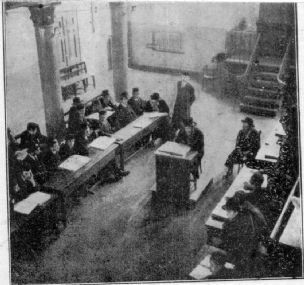
Rabbi Meir Shapira giving over a lesson to the yeshiva students
“Any rascal will not bother me”
We have already shown above what Rabbi Shapira wrote in his letter about Chachmei Lublin yeshiva charity boxes, in this phrase about the Gerrer Rebbe z”l. Rabbi Binyamin Zev Handels z”l (in the book Siach Zekenim, part 3, pg 364 and more) that he heard from Rabbi Shapira, who said to him:
“I once asked the genius Rabbi Menachem Ziemba: How touching was the greatness of the Rebbe? Rabbi Menachem replied: ‘I have already put my finger on the face of most of the greats of the generation, and I would surprise them all with a certain innovation, which brought them to admiration, no, Rabbi, it hasn’t happened yet. Once, I start lecturing on a new thing, and the Rebbe doesn’t continue and completes everything I wanted to say himself… It has never happened that I lecture him on some Torah thing, and he didn’t know about it…'”
On one of the occasions, Rabbi Shapira spoke before his distinguished student from Piotrkow, Rabbi Mordechai Shtelberg z”l:
“I once ran into the Gerrer Rebbe in the healing town of Marienbad on the evening of Tisha B’Av and I was asked by him if I had finished learning a tractate in time for the end of the fast. I replied in the affirmative.”
“The next night I went to the Rebbe to hold a siyum (celebration for finishing studying a portion of the Mishna), and the Rebbe asked me: What tractate are you going to finish?’ I answered: Tractate Chagiga.'”
“We didn’t have time to wash hands for the meal – Rabbi Shapira finished his story – until we had studied the entire Tractate Chagiga together with the commentaries of Tosfot.”
Rabbi Yaakov Broner z”l, the author, added and described:
“My father and teacher, the chassidic Rabbi Shmuel Broker z”l told me:
In one of the years (the week of the Torah portion of Va’etchanan 5685/1925), the Gerrer Rebbe decided to arrange his return from the city of Marienbad to Warsaw, in such a way that he would return to Prague on Shabbat. This was surprising, because there were only a few religious Jews in Prague at that time. The Rebbe also did not stay with anyone in the city. All the Shabbat needs were prepared in Marienbad and taken with them to Prague. Several rooms were rented in a separate wing of a hotel, where all arrangements were made for Shabbat.”
“On the eve of Shabbat, the Rebbe left Marienbad with a number of people, including Rabbi Meir Shapira of Lublin z”l, and went straight to the hotel, where they stayed all Shabbat, until they continued their journey from Prague to Warsaw when Shabbat ended. My father z”l was also among those who came. As mentioned, they hardly left the hotel during Shabbat. Everything was arranged on the spot, the prayers, the feasts, etc. It was a wonderful experience to sit all of Shabbat together with the Rebbe and hear his holy words.”
“In one of the conversations, the Rabbi of Lublin (Rabbi Shapira) mentioned one of the Rambam’s articles on the laws of sacrifice (as is known, the Rabbi of Lublin dealt a lot with sacred matters). By the way, the rabbi said that the Rambam’s wording was slightly different, by one letter, from the wording that the Rabbi of Lublin said.”
“They didn’t have the Rambam’s book ‘Yad HaChazaka’ with them to check the matter. However, the Rabbi from Lublin could not resist and wanted to find out the exact wording immediately and on the spot. My father z”l told him that there was a stricly Orthodox family there, the family of Professor Shlomo Menachem Liben z”l (who participated in the second Great Congress, and was the initiator of the discussion about the ‘slaughter decree’ that was then in place in several European countries), who served as a professor at the University of Prague. Father was sure that they would be able to find the book Yad HaChazaka’ with him. On Saturday afternoon, they went together to the city to Professor Liban, to look at the Rambam book. And how great was the silence of the Rabbi from Lublin, who found the text in Rambam to be exactly as the Rebbe said it. So he turned to my father z”l and said: ‘I have always known that we have no idea of the greatness of your Rebbe (the Rabbi from Lublin was a follower of Czortkower Rebbe), but for such a rabbi, let me be caught, casually, by saying one extra or omitting a letter in Rambam in the laws of making sacrifices – I did not fail.'”
The chassid, Rabbi Shmuel Bialistotsky z”l of Jerusalem, recounted an episode that he was an eyewitness to:
“When Rabbi Shapira was with the Gerrer Rebbe in Ludmir, they would talk a lot about Torah and wisdom.”
“Once, Rabbi Shapira turned to the Rebbe z”l and asked him to explain the words in Tractate Chagiga 4b.”
“In the Gemara there, it says that Shmuel asked Moshe ‘Perhaps, Heaven forbid, I was summoned for judgment by God; stand with me and testify on my behalf that there is nothing that you wrote in the Torah that I did not fulfill.'”
“And it states in the Tosfot commentary: ‘He did not want to say that he should testify for him (Shmuel) that he fulfilled everything, for how would he (Moshe) know? He was not in his generation! Rather, (Shmuel) would say: I expounded and did like this and like this. [Moshe,] testify for me that also you taught like this.’ And the words are very wonderful regarding what sermon the Tosfot are referring to here; they are the words Shmuel spoke asking for Moshe’s consent.”
“The Gerrer Rebbe z”l waited a moment and said:
The prophet Shmuel knew that he certainly did not sin in anything, but when he saw Saul calling him, he was afraid that he would come to him claiming that he took the kingdom from him and gave it to David, and it is explained in the Gemara (Yevamot 77a) that Saul and the Edomite were divided whether David was allowed to come into the congregation, and Doeg the Edomite said: ‘This is how I am accepted from the court of Shmuel the Harmatite, an Ammonite and not an Ammonite Moabite and not a Moabite, and at that time David was allowed to come in to the congregation.'”
“And for this sermon, Shmuel asked for the approval of Moshe.”
“And the words are incredibly accurate in the above verse: ‘Otherwise he would have said – so and so I demanded and I did a deed (namely, that I made David king due to this sermon) come and testify that you also learned like this.'”
“Rabbi Shapira stood amazed…”
A Jew from the Town Next to Warsaw
Rabbi Shapira had a special appreciation for the humbleness of the Gerrer Rebbe; once he told his rabbi, Rabbi Yisrael of Czortkow in amazement that the first time he met him the Imrei Emet, the Gerrer Rebbe, he did not know him, and when he was asked who he was, the Rebbe replied: “I am from a small town near Warsaw…”
Rabbi Shapira continued by saying:
The Gerrer Rebbe did not feel like he was being humble in this respect, since he really believed that he was nothing more than a simple Jew from a small town near Warsaw. He simply said what he thought of himself.
Revealed Ruach HaKodesh (Divine Spirit)
Once Rabbi Shapira asked to travel to Germany for public purposes, and he went to ask for the blessing of the Rebbe. When he told the Rebbe the purpose of his visit, he hid the destination of his trip and only said that he wanted to go abroad [because he was afraid that the Rebbe’s opinion would not be favourable towards traveling there], but to his surprise the Rebbe answered him that it was not the case and opened by saying: “It says in the Mishna (Ethics of the Fathers 2:2) that ‘excellent is the study of the Torah when combined with a worldly occupation, for toil in them both keeps sin out of one’s mind.’ And why do we not hold by this in the yeshivas and shtiblach (small synagogues) in Poland, learning Torah alongside working? It is because this issue with us is like ‘his brother died because of a word.’ That is to say – since many have already fallen away from the path of Judaism as a result of leaving for livelihood and work at too young an age, and since they have come, God forbid, to assimilation and terrible corruption, that is why we fear this path.”
And Rabbi Shapira wondered to himself what the meaning of these words were and what was its connection to the matter of his journey now. When he arrived in one of the cities in Germany, a welcome party was held in his honour there with the participation of important rabbis from the great people of German Jewry, and one of the rabbis asked to ask Rabbi Shapira two questions about the people of Poland and their customs. (1) Why do they travel to ask advice from the righteous and to act according to their instructions, when we no longer have prophecy and Divine spirit? and (2) Why don’t they observe in Poland the words of the Mishna “excellent is Torah study along with a worldy occupation”? And Rabbi Shapira answered the two questions as one; he related what happened with him when they went in to receive a farewell from the Gerrer Rebbe, from whom he heard an answer to the study question, and also sensed how deep and wide the Rebbe’s holy vision was.
(Yafeh Shehyichaten, London 5783/2022 pg. 18-19 )
From the Hodu to Aleinu Prayers
In general, when Rabbi Shapira was in Marienbad on Shabbat, he would pray with the Gerrer Rebbe z”l.
According to the testimony of chassid, Rabbi Moshe Shmuel Segal z”l, one of Rabbi Shapira’s close associates, Rabbi Shapira used to lead the services of Maariv on Saturday night from the prayers of Hodu to Aleinu, and all those present enjoyed his deep and heartwarming voice.
The Last Year
In later years, Rabbi Shapira was burdened with the enormous debts of the yeshiva, and he received a proposal from the wealthy community of Lodz, that he would come to their city to serve as the rabbi of the city, and they would in turn cover the yeshiva’s enormous debts.
Along with the appointment, Rabbi Shapira was required to come and live in the city of Lodz for two weeks every month, while the other two weeks he could stay among his beloved students.
It was very difficult for Rabbi Shapira at this time to abandon his students and the yeshiva which was then in full spiritual bloom, and in his heart pushed says to postpone the offer until a year later, and in the meantime continue to deal with the heavy burden of debt.
For this purpose, he went to the Gerrer Rebbe z”l, to consult with him and to hear his opinion on the matter.
According to the genius Rabbi Moshe Yoel Lebel z”l, one of the students of the yeshiva, who accompanied Rabbi Shapira on the trip:
“Rabbi Shapira sat in the Gerrer Rebbe’s room for a long time, and when he left he told his companion that the Rebbe was interested in all the details of the difficult yeshiva situation, and in the solution of the Rabbinate’s proposal which Rabbi Shapira was inclined to postpone for a year.”
“The Rebbe heard and was quite, and finally said:
‘Perhaps next year will be too late…'”
This was in the first week of the month of Cheshvan 5693 (1932). Exactly one year later, Rabbi Shapira succumbed to the pressure and passed away…
On His Last Journey
And here came a hard day for the Jews; on Friday, the eve of the Shabbat when the Torah portion of Lech Lecha is read, on Cheshvan 7, 5684 (Oct. 27, 1933), Rabbi Shapira passed away suddenly at only 47 years old.
The great mourning that reigned amongst the Jews is indescribable. Many Jews flocked to Lublin for his funeral that was held on Sunday.
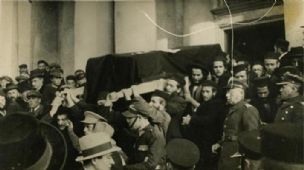
Students of Rabbi Meir Shapira of Lublin carrying his coffin
In the town of Gur (Gora Kalwaria), Rabbi Shimon Naftali Alter z”l, who planned to travel to the funeral in Lublin, went to see the Imrei Emet z”l to receiving a parting blessing.
The Rebbe was not feeling well in those days, and he was prevented from traveling by himself to participate in the funeral
When he entered, he noticed the terrible sadness that was on the holy face of the Rebbe. The Rebbe parted from him and wished him well and added the obscure words:
“When you will be in Lublin, it is worthwhile to go to the community building and look at the community register…”
Rabbi Shimon Naftali Alter traveled to Lublin, participated in the large funeral, and went afterwards to the community building. There, like all communities in Poland, there was a community register covering the past hundreds of years, generation after generation.
For the price of one zloty, the Rabbi Shimon Naftali z”l received one volume out of the many volumes that were there to peruse. He opened it, and to his astonishment a page opened in front of him, and in bold letters, it told an old regulation in the city of Lublin, that a rabbi who was appointed as a rabbi and the head of the beit din (religious court) of Lublin, may not be appointed as the rabbi of another city… (Told by the chassid, Rabbi Shlomo Frankel z”l and the chassid Rabbi Chaim Tzvi Abuvitz, who heard the story from Rabbi Shimon Naftali Alter z”l)
Indeed, it should be noted that, historically speaking, for two hundred years, no rabbi in Lublin left the city to accept another rabbinical position, except for those who immigrated to Eretz Yisrael such as the Torat Chessed z”l and the genius Rabbi Eliyahu Klatzkin z”l.
In years gone by, Rabbi Simcha Bunim Rapoport served as the rabbi of Lublin and he was appointed as rabbi in Lvov, and he went there to accept the position, and when he was half way there in Szczebrzeszyn, he died, without even seeing the city of Lvov…


